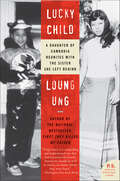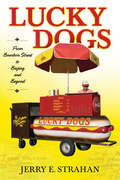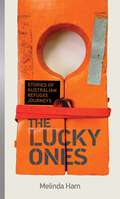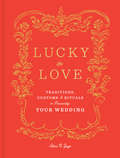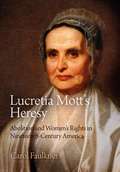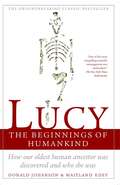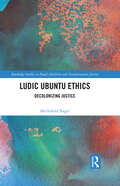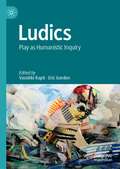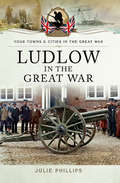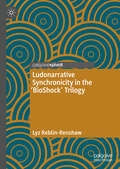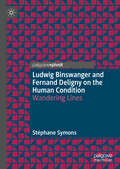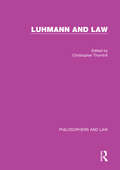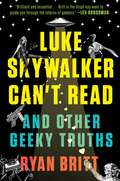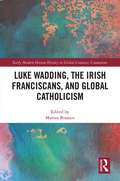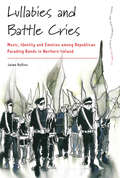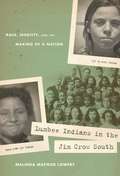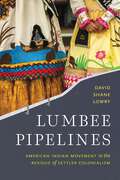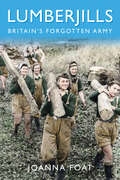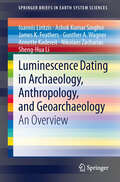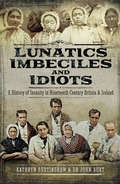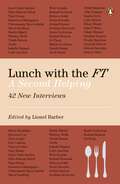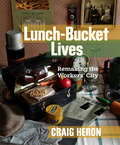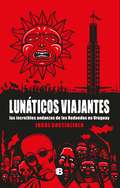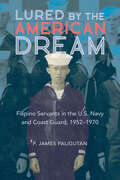- Table View
- List View
Lucky Child: A Daughter of Cambodia Reunites with the Sister She Left Behind (P. S. Ser.)
by Loung UngAfter enduring years of hunger, deprivation, and devastating loss at the hands of the Khmer Rouge, ten-year-old Loung Ung became the "lucky child," the sibling chosen to accompany her eldest brother to America while her one surviving sister and two brothers remained behind. In this poignant and elegiac memoir, Loung recalls her assimilation into an unfamiliar new culture while struggling to overcome dogged memories of violence and the deep scars of war. In alternating chapters, she gives voice to Chou, the beloved older sister whose life in war-torn Cambodia so easily could have been hers. Highlighting the harsh realities of chance and circumstance in times of war as well as in times of peace, Lucky Child is ultimately a testament to the resilience of the human spirit and to the salvaging strength of family bonds.
Lucky Dogs: From Bourbon Street to Beijing and Beyond
by Jerry E. StrahanWhen walking the French Quarter and watching a Lucky Dog salesman set up that colorful cart and call out to entice customers, don't you wonder how such a business works? As a knowing review in Rolling Stone stated, "People have always loved the cart and harbored a mysterious need to ride it. Revelers have been known to climb on top of the rolling wienies, screaming 'Yippee kaya!' as vendors stoically push them back to the barn at 4 a.m." Since 1947 the red and yellow carts have trumpeted good fortune and sustenance.Jerry E. Strahan recounts the wild adventures of the Bourbon Street wienie salesmen but also takes readers well beyond New Orleans. In fact, he takes them halfway around the world, where this unique pushcart business maneuvered its way through the bureaucratic red tape of a communist country to become a licensed corporation in the People's Republic of China.In China, two points quickly became apparent to Strahan. First, 99 percent of the Chinese population had no idea what a Lucky Dog cart represented. One elderly passerby declared it to be a missile. Second, the success or failure of any joint venture in the Asian nation is directly proportional to the political clout of that company's local partner.Lucky Dogs also recounts how the business and its vendors survived Hurricane Katrina. Miraculously, it reopened only six months after the storm in a city where more than 80 percent of the landmass had been flooded and where less than 40 percent of the population had returned. To reestablish itself in what many described as Third World conditions, the company had to transform its operation.This work mixes business history, autobiography, survival story, and an insider's look at the bizarre lives of some of Bourbon Street's most quirky characters--the dauntless Lucky Dog vendors. Both humorous and tragic, though it may read like fiction, it is, for better or worse, all fact.
Lucky Ones: Stories of Australian refugee journeys
by Melinda HamThe Lucky Ones is a moving and meticulously researched book of refugee stories from award-winning journalist and former foreign correspondent Melinda Ham.Though they are from different generations, countries and cultures, the families in this book all have one thing in common: they have escaped persecution in their homelands to find safety in Australia. Spanning 70 years, and tracking journeys from Iraq, Afghanistan, Poland, Tibet, Vietnam and Zaire, The Lucky Ones offers a window into the complex history of Australian refugee experiences.More than 35 million refugees around the world are currently waiting to be resettled. In their own words, the people in this book are some of the 'lucky ones' who survived terror, detention, beatings and torture to reach a country that offered them a new beginning.
Lucky in Love: Traditions, Customs, and Rituals to Personalize Your Wedding
by Eleni N. GageEvery engaged couple wants two things: a meaningful wedding and a lifetime of happiness. This great gift book is a cross-cultural collection of marriage folklore that will help you achieve both. Create your own lucky traditions with nods to each other’s heritage, customs from places you’ve visited together, and auspicious rituals that just feel special. Whether you are just engaged or you’re days away from tying the knot, you’ll gain insight every step of the way. With this book as your guide, you can make your own luck in love.
Lucretia Mott's Heresy
by Carol FaulknerLucretia Coffin Mott was one of the most famous and controversial women in nineteenth-century America. Now overshadowed by abolitionists like William Lloyd Garrison and feminists such as Elizabeth Cady Stanton, Mott was viewed in her time as a dominant figure in the dual struggles for racial and sexual equality. History has often depicted her as a gentle Quaker lady and a mother figure, but her outspoken challenges to authority riled ministers, journalists, politicians, urban mobs, and her fellow Quakers.In the first biography of Mott in a generation, historian Carol Faulkner reveals the motivations of this radical egalitarian from Nantucket. Mott's deep faith and ties to the Society of Friends do not fully explain her activism--her roots in post-Revolutionary New England also shaped her views on slavery, patriarchy, and the church, as well as her expansive interests in peace, temperance, prison reform, religious freedom, and Native American rights. While Mott was known as the "moving spirit" of the first women's rights convention at Seneca Falls, her commitment to women's rights never trumped her support for abolition or racial equality. She envisioned women's rights not as a new and separate movement but rather as an extension of the universal principles of liberty and equality. Mott was among the first white Americans to call for an immediate end to slavery. Her long-term collaboration with white and black women in the Philadelphia Female Anti-Slavery Society was remarkable by any standards. Lucretia Mott's Heresy reintroduces readers to an amazing woman whose work and ideas inspired the transformation of American society.
Lucy: The Beginnings of Humankind
by Maitland A. Edey Donald C. JohansenThe dramatic discovery of our oldest human ancestor and the controversial change it makes in our view of human origins<P><P> Winner of the National Book Award
Ludic Ubuntu Ethics: Decolonizing Justice (Routledge Studies in Penal Abolition and Transformative Justice)
by Mechthild NagelLudic Ubuntu Ethics develops a positive peace vision, taking a bold look at African and Indigenous justice practices and proposes new relational justice models. ‘Ubuntu’ signifies shared humanity, presenting us a sociocentric perspective of life that is immensely helpful in rethinking the relation of offender and victim. In this book, Nagel introduces a new theoretical liberation model—ludic Ubuntu ethics—to showcase five different justice conceptions through a psychosocial lens, allowing for a contrasting analysis of negative Ubuntu (eg., through shaming and separation) towards positive Ubuntu (eg., mediation, healing circles, and practices that no longer rely on punishment). Providing a novel perspective on penal abolitionism, the volume draws on precolonial (pre-carceral) Indigenous justice perspectives and Black feminism, using discourse analysis and a constructivist approach to justice theory. Nagel also introduces readers to a post secular turn by taking seriously the spiritual dimensions of healing from harm and highlighting the community’s response. Spanning disciplinary boundaries and aimed at readers seeking to understand how to move beyond reintegrative shaming and restorative justice theories, the volume will engage scholars of criminology, philosophy and law, and more specifically penal abolitionism, social ethics, peace studies, African studies, critical legal studies, and human rights. It will also be of great interest to practitioners and activists in restorative justice, mediation, social work, and performance studies.
Ludics: Play as Humanistic Inquiry (Studies In Surrealism Ser.)
by Eric Gordon Vassiliki RaptiThis book establishes play as a mode of humanistic inquiry with a profound effect on art, culture and society. Play is treated as a dynamic and relational modality where relationships of all kinds are forged and inquisitive interdisciplinary engagement is embraced. Play cultivates reflection, connection, and creativity, offering new epistemological directions for the humanities. With examples from a range of disciplines including poetry, history, science, religion and media, this book treats play as an object of inquiry, but also as a mode of inquiry. The chapters, each focusing on a specific cultural phenomenon, do not simply put culture on display, they put culture in play, providing a playful lens through which to see the world. The reader is encouraged to read the chapters in this book out of order, allowing constructive collision between ideas, moments in history, and theoretical perspectives. The act of reading this book, like the project of the humanities itself, should be emergent, generative, and playful.
Ludlow in the Great War (Your Towns & Cities in the Great War)
by Julie PhillipsWars affect everyone. Whether they are fought on the battlefields or on the home front, by the armed forces or civilians, sacrifices have to be made, and everyone suffers one way or another. This book gives a flavour of what it was like to live in Ludlow through the Great War years. Ludlow was proud to send its brothers, husbands, uncles and fathers to fight for King and Country, many of whom had never been far from home before, some who came from decorated service backgrounds for whom the armed services was in their blood. Rich or poor, farm worker, office manager or son of a wealthy estate owner, they all united to defend their town and protect British values and way of life. Life continued as usual for many of those on the home front despite, amongst other things, the introduction of DORA, rationing and the loss of the labour force from the farms. Ludlow was already generous in its giving to the poor but this was taken to a whole new level with the introduction of many national and local war charities. They knitted, sewed, auctioned and sung their way through the war even a patriotic donkey called Willie and a pig did their bit by being auctioned several times to raise money for the war effort.This show of patriotism and stoicism was made against the backdrop of a bloody and heinous war that went on far longer than anticipated. The constant threat of receiving the dreaded telegram indicating their loved ones fate was never far from the minds of Ludlow's civilians, yet the people of Ludlow kept the home fires burning brightly.
Ludonarrative Synchronicity in the 'BioShock' Trilogy
by Lyz Reblin-RenshawThis book presents a new methodology, ludonarrative synchronicity, to analyze the interplay between narrative and gameplay in video games. Using the BioShock franchise as a case study, this book aims to show the interaction of these two elements can form various subjects. Rather than prioritizing one over the other, ludonarrative synchronicity seeks to explore how video game texts function. By analyzing a trio of games focused on choice and control, this book manages to show how players, along with developers, can create their own subjects. Ludonarrative Synchronicity in the BioShock Trilogy will appeal not only to fans of the franchise, but to students and scholars of narrative theory, game design, and posthumanism.
Ludwig Binswanger and Fernand Deligny on the Human Condition: Wandering Lines
by Stéphane SymonsPhilosophical thinking allows itself to be nourished by seemingly non-committal exercises of thought but at the same time seeks forms of irrefutable knowledge. Because of this focus on both the subjective and the universal, philosophy also falls for the lure of the “what-if?” question. What if two legendary artists, writers or philosophers, who did not know each other, did enter into a conversation? In this book, Stéphane Symons outlines an (im)possible conversation between Swiss psychiatrist and philosopher Ludwig Binswanger (1881-1966) and French educator, philosopher, poet and filmmaker Fernand Deligny (1913-1996). Although the two never met, this imaginary conversation can offer insight into both authors' thinking and the human condition. According to Binswanger, self-awareness and social consciousness are the most important and characteristic features of human beings. In contrast, from his contacts with children and adolescents with autism, Deligny emphasizes our ability to interact with the material environment, especially with seemingly insignificant things and nature. Bringing the two thinkers into conversation, Symons sheds new light on what it is to be truly human. In the process, leading roles are played by one of Binswanger's patients, Ellen West, and a young boy with autism, Janmari.
Luhmann and Law (Philosophers And Law Ser.)
by Christopher ThornhillNiklas Luhmann wrote a number of works which have decisively shaped the recent development of legal science as a theoretical discipline. Some basic elements of his theory have been widely appropriated by other legal theorists, such that it is difficult to imagine contemporary reflection in legal theory, and above all legal sociology, without Luhmann. This collection brings together the most important canonical and cutting-edge papers on Luhmann’s legal thought. It is introduced in a comprehensive editorial piece by the editor which locates the articles in context and explores the issues and topics at hand.
Luke Skywalker Can't Read: And Other Geeky Truths
by Ryan Britt"Ryan Britt is . . . the Virgil you want to guide you through the inferno of geekery." --Lev Grossman, author of the bestselling Magician's trilogy Pop Culture and sci-fi guru Ryan Britt has never met a monster, alien, wizard, or superhero that didn't need further analysis. Essayist Ryan Britt got a sex education from dirty pictures of dinosaurs, made out with Jar-Jar Binks at midnight, and figured out how to kick depression with a Doctor Who Netflix-binge. Alternating between personal anecdote, hilarious insight, and smart analysis, Luke Skywalker Can't Read contends that Barbarella is good for you, that monster movies are just romantic comedies with commitment issues, that Dracula and Sherlock Holmes are total hipsters, and, most shockingly, shows how virtually everyone in the Star Wars universe is functionally illiterate. Romp through time and space, from the circus sideshows of 100 years ago to the Comic Cons of today, from darkest corners of the Galaxy to the comfort of your couch. For anyone who pretended their flashlight was a lightsaber, stood in line for a movie at midnight, or dreamed they were abducted by aliens, Luke Skywalker Can't Read is full of answers to questions you haven't thought to ask, and perfect for readers of Chuck Klosterman, Rob Sheffield, and Ernest Cline.From the Trade Paperback edition.
Luke Wadding, the Irish Franciscans, and Global Catholicism (Early Modern Iberian History in Global Contexts)
by Matteo BinascoThis book explores the endeavors and activities of one of the most prominent early modern Irishmen in exile, the Franciscan Luke Wadding. Born in Ireland, educated in the Iberian Peninsula, Wadding arrived in Rome in 1618, where he would die in 1657. In the "Eternal City," the Franciscan emerged as an outstanding theologian, a learned scholar, a diplomat, and a college founder. This innovative collection of chapters brings together a group of international scholars who provide a ground-breaking analysis of the many cultural, political, and religious facets of Wadding&’s life. They illustrate the challenges and changes faced by an Irishman who emerged as one of the most outstanding global figures of the Catholic Reformation. The volume will attract scholars of the early modern period, early modern Catholicism, and Irish emigration.
Lullabies and Battle Cries: Music, Identity and Emotion among Republican Parading Bands in Northern Ireland (Dance and Performance Studies #13)
by Jaime RollinsSet against a volatile political landscape, Irish republican culture has struggled to maintain continuity with the past, affirm legitimacy in the present, and generate a sense of community for the future. Lullabies and Battle Cries explores the relationship between music, emotion, memory, and identity in republican parading bands, with a focus on how this music continues to be utilized in a post-conflict climate. As author Jaime Rollins shows, rebel parade music provides a foundational idiom of national and republican expression, acting as a critical medium for shaping new political identities within continually shifting dynamics of republican culture.
Lumbee Indians in the Jim Crow South
by Malinda Maynor LoweryWith more than 50,000 enrolled members, North Carolina's Lumbee Indians are the largest Native American tribe east of the Mississippi River. Malinda Maynor Lowery, a Lumbee herself, describes how, between Reconstruction and the 1950s, the Lumbee crafted and maintained a distinct identity in an era defined by racial segregation in the South and paternalistic policies for Indians throughout the nation. They did so against the backdrop of some of the central issues in American history, including race, class, politics, and citizenship.Lowery argues that "Indian" is a dynamic identity that, for outsiders, sometimes hinged on the presence of "Indian blood" (for federal New Deal policy makers) and sometimes on the absence of "black blood" (for southern white segregationists). Lumbee people themselves have constructed their identity in layers that tie together kin and place, race and class, tribe and nation; however, Indians have not always agreed on how to weave this fabric into a whole. Using photographs, letters, genealogy, federal and state records, and first-person family history, Lowery narrates this compelling conversation between insiders and outsiders, demonstrating how the Lumbee People challenged the boundaries of Indian, southern, and American identities.
Lumbee Pipelines: American Indian Movement in the Residue of Settler Colonialism
by Dr. David Shane LowryIn Lumbee Pipelines David Shane Lowry (Lumbee) examines the historical and modern paths, or &“pipelines,&” through which members of the Lumbee Tribe of North Carolina maintain Lumbee national identity, community practices, and tribal sovereignty. Through extensive ethnographic research and contextualization, Lowry explores these pipelines: the programs and traditions through which the Lumbee people engineer the settler-colonial conditions that define life in North Carolina and the United States as a whole. Even as the Lumbee community depends on the economics, politics, and histories of settler colonialism, those realities at once threaten Lumbee life, freedom, and community. Despite that conflict, Lumbee people use these pipelines to protect their interests and to influence the world in the realms of public infrastructure and education, healthcare services, humanitarian networks, fossil fuel pipelines, environmental degradation, and artificial intelligence. Lowry paints an intimate portrait of how individual Lumbees define their identities and sense of being, revealing the disputes and affinities between Lumbee community members in various states of accepting and rejecting settler-colonial circumstances.Lumbee Pipelines engages conversations about how, even as American Indian identities and communities are often erased amid the business of contemporary American life, Lumbee people have devised ways to empower and enrich themselves and other peoples by repurposing and evading the genocidal pressures that define settler-colonial society.
Lumberjills: Britain's Forgotten Army
by Joanna FoatWhen war was declared in 1939, Britain was almost completely dependent on imported timber – but only had seven months of it stockpiled. Timber was critical to the war effort: it was needed for everything from aircraft and shipbuilding to communications and coal mining. The British timber trade was in trouble. Enter the Lumberjills. Lacking in both men and timber, the government made a choice. Reluctantly, they opened lumber work for women to apply – and apply they did. The Women’s Timber Corps had thousands of members who would prove themselves as strong and as smart as any man: they felled and crosscut trees by hand, operated sawmills, and ran whole forestry sites. They may not have been on the front line, but they fought their own battles on the home front for respect and equality. And in the midst of heavy labour and wartime, they lived a life, making firm friends and even finding soulmates. In Lumberjills, researcher Joanna Foat tells their story for the first time, and gives them the recognition they so truly deserve.
Luminescence Dating in Archaeology, Anthropology, and Geoarchaeology: An Overview
by Annette Kadereit Ioannis Liritzis Sheng-Hua Li Rudolf Wagner Jim Feathers Nikolaos Zacharias Ashok SinghviThe field of Luminescence Dating has reached a level of maturity. Both research and applications from all fields of archaeological science, from archaeological materials to anthropology and geoarchaeology, now routinely employ luminescence dating. The advent of optically stimulated luminescence (OSL) techniques and the potential for exploring a spectrum of grain aliquots enhanced the applicability, accuracy and the precision of luminescence dating. The present contribution reviews the physical basis, mechanisms and methodological aspects of luminescence dating; discusses advances in instrumentations and facilities, improvements in analytical procedures, and statistical treatment of data along with some examples of applications across continents, covering all periods (Middle Palaeolithic to Medieval) and both Old and New World archaeology. They also include interdisciplinary applications that contribute to palaeo-landscape reconstruction.
Lunatic Asylums in Colonial Bombay: Shackled Bodies, Unchained Minds (Mental Health in Historical Perspective)
by Sarah Ann PintoThis book traces the historical roots of the problems in India’s mental health care system. It accounts for indigenous experiences of the lunatic asylum in the Bombay Presidency (1793-1921). The book argues that the colonial lunatic asylum failed to assimilate into Indian society and therefore remained a failed colonial-medical enterprise. It begins by assessing the implications of lunatic asylums on indigenous knowledge and healing traditions. It then examines the lunatic asylum as a ‘middle-ground’, and the European superintendents’ ‘common-sense’ treatment of Indian insanity. Furthermore, it analyses the soundscapes of Bombay’s asylums, and the extent to which public perceptions influenced their use. Lunatic asylums left a legacy of historical trauma for the indigenous community because of their coercive and custodial character. This book aims to disrupt that legacy of trauma and to enable new narratives in mental health treatment in India.
Lunatics, Imbeciles and Idiots: A History of Insanity in Nineteenth-Century Britain and Ireland
by Kathryn Burtinshaw Dr. John Burt&“Reveals the grisly conditions in which the mentally ill were kept . . . [and] harrowing details of the inhumane and gruesome treatment of these patients.&”—Daily Mail In the first half of the nineteenth century, treatment of the mentally ill in Britain and Ireland underwent radical change. No longer manacled, chained and treated like wild animals, patient care was defined in law and medical understanding, and treatment of insanity developed. Focusing on selected cases, this new study enables the reader to understand how progressively advancing attitudes and expectations affected decisions, leading to better legislation and medical practice throughout the century. Specific mental health conditions are discussed in detail and the treatments patients received are analyzed in an expert way. A clear view of why institutional asylums were established, their ethos for the treatment of patients, and how they were run as palaces rather than prisons giving moral therapy to those affected becomes apparent. The changing ways in which patients were treated, and altered societal views to the incarceration of the mentally ill, are explored. The book is thoroughly illustrated and contains images of patients and asylum staff never previously published, as well as first-hand accounts of life in a nineteenth-century asylum from a patient&’s perspective. Written for genealogists as well as historians, this book contains clear information concerning access to asylum records and other relevant primary sources and how to interpret their contents in a meaningful way. &“Through the use of case studies, this book adds a personal note to the historiography in a way that is often missing from scholarly works.&”—Federation of Family History Societies
Lunch with the FT: A Second Helping
by Lionel BarberLunch with the FT has been a permanent fixture in the Financial Times for almost 30 years, featuring presidents, film stars, musical icons and business leaders from around the world.The column is now a well-established institution, which has reinvigorated the art of conversation in the convivial, intimate environment of a long and boozy lunch.This new and updated edition includes lunches with:Elon MuskDonald TrumpHilary MantelRichard BransonZadie SmithNigel FarageRussell BrandDavid GuettaYanis VaroufakisJean-Claude JunckerGwyneth PaltrowRebecca SolnitJordan PetersonChimamanda Ngozi AdichieAnd more...
Lunch-Bucket Lives: Remaking the Workers’ City
by Craig HeronLunch-Bucket Lives takes the reader on a bumpy ride through the history of Hamilton’s working people from the 1890s to the 1930s. It ambles along city streets, peers through kitchen doors and factory windows, marches up the steps of churches and fraternal halls, slips into saloons and dance halls, pauses to hear political speeches, and, above all, listens for the stories of men, women, youths, and children from families where people relied mainly on wages to survive. Heron takes wage-earning as a central element in working-class life, but also looks beyond the workplace into the households and neighbourhoods—settlement patterns and housing, marriage, child care, domestic labour, public health, schooling, charity and social work, popular culture, gender identities, ethnicity and ethnic conflict, and politics in various forms—presenting a comprehensive view of working-class life in the first half of the twentieth century. This book has been published with the help of a grant from the Federation for the Humanities and Social Sciences, through the Awards to Scholarly Publications Program, using funds provided by the Social Sciences and Humanities Research Council of Canada.
Lunáticos viajantes: Las increíbles andanzas de Los Redondos en Uruguay
by Jorge CostiglioloA 20 años de su último recital en Montevideo conoceremos la historia, anécdotas y protagonistas de una relación de amor, pasión y rock and roll. Desde su nacimiento a fines de los años 70 en la de La Plata Patricio Rey y sus redonditos de ricota se convirtieron en un fenómeno cultural casi exclusivo de Argentina, salvo por Uruguay. Este libro repasa a través de testimonios, historias, anécdotas, mitos, verdades y leyendas las veces de cómo, cuándo y de qué manera Los Redondos se vincularon con Uruguay.
Lured by the American Dream: Filipino Servants in the U.S. Navy and Coast Guard, 1952-1970 (Asian American Experience)
by P. James PaligutanStarting in 1952, the United States Navy and Coast Guard actively recruited Filipino men to serve as stewards--domestic servants for officers. Oral histories and detailed archival research inform P. James Paligutan's story of the critical role played by Filipino sailors in putting an end to race-based military policies. Constrained by systemic exploitation, Filipino stewards responded with direct complaints to flag officers and chaplains, rating transfer requests that flooded the bureaucracy, and refusals to work. Their actions had a decisive impact on seagoing military’s elimination of the antiquated steward position. Paligutan looks at these Filipino sailors as agents of change while examining the military system through the lens of white supremacy, racist perceptions of Asian males, and the motives of Filipinos who joined the armed forces of the power that had colonized their nation. Insightful and dramatic, Lured by the American Dream is the untold story of how Filipino servicepersons overcame tradition and hierarchy in their quest for dignity.
